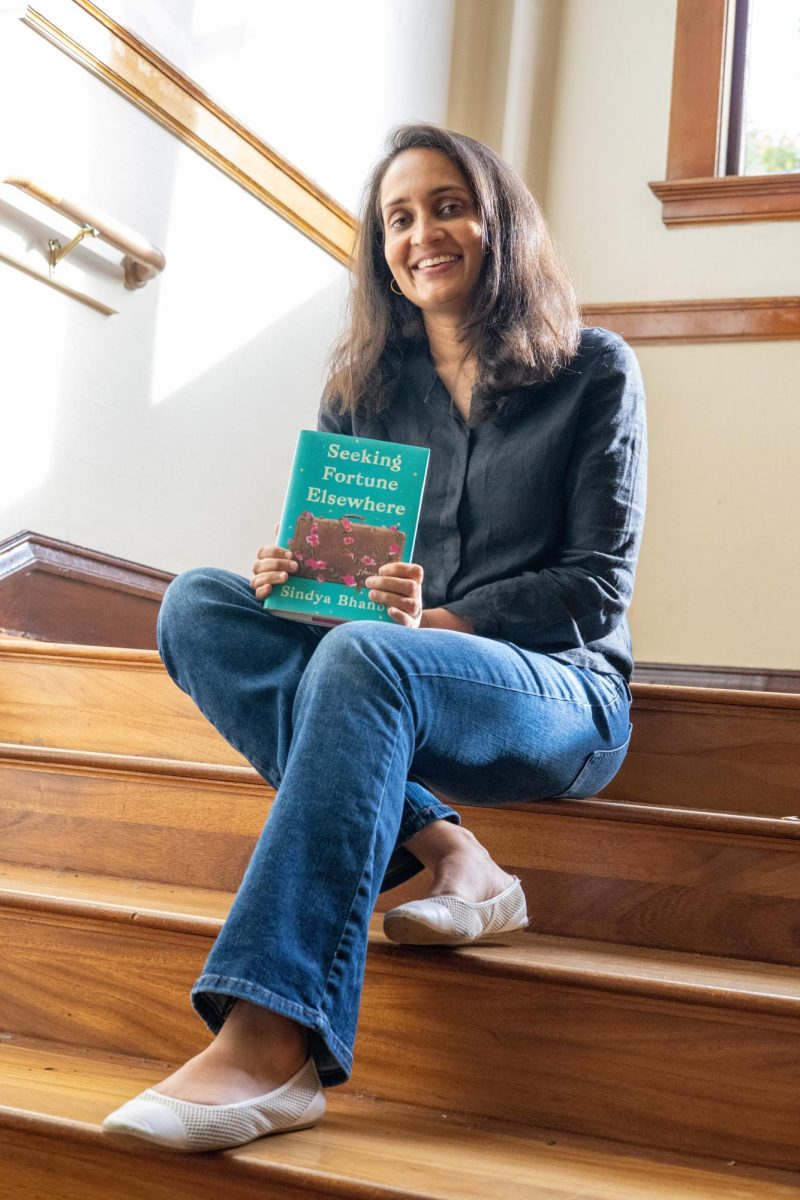As an undergraduate student studying computer science at Carnegie Mellon University, writing was never an area of study for Sindya Bhanoo.
“I didn’t (do any writing) in college, but I really wish I had,” Bhanoo said.
Bhanoo enjoyed computer science, and went on to have internships within the field, but she was always drawn to the want to tell other people’s stories, eventually leading her to getting a master’s degree in journalism from University of California, Berkeley.
“I knew from a very young age that I was always interested in people’s stories, and I had this awareness that people don’t know each other’s stories,” said Bhanoo, now an assistant professor in Oregon State University’s School of Writing, Literature and Film.
Bhanoo has since made a career out of telling stories, and her first novel, “Seeking Fortune Elsewhere,” has won the Ken Kesey Award for Fiction at 2023’s Oregon Book Awards.
Bhanoo’s novel is composed of eight short stories that focus on families of immigration. It was published in spring of 2022. The novel won the Ken Kesey award this April, as well as winning the Writers’ League of Texas Book Award for fiction and the New American Voices Award in 2022.
Shruti Swamy, a judge for the Oregon Book Awards, said, “‘Seeking Fortune Elsewhere’” moves with the quiet assurance of a sneaker wave that leaves you suddenly drenched – and glad.”
While fiction writing was always at the back of Bhanoo’s mind, she chose to focus on journalism at the start of her career, allowing her to explore a wide variety of topics.
While in graduate school, Bhanoo recalls how she learned two important things to pay attention while reporting, including looking at “what is not being covered” and “stories that you are interested in, (stories) you can bring your knowledge, expertise and curiosity to.”
Bhanoo’s first stop was interning at the Washington Post, where she experienced a “fast-paced summer” that allowed her to write a variety of different stories, ranging from feature pieces to daily news.
Although writing for The Washington Post helped Bhanoo find her interests, it also helped her find what she wasn’t interested in.
“I realized I wasn’t a daily reporter who wanted to be running around all the time,” Bhanoo said, although she added she still contributes to the Washington Post from time-to-time.
In 2009, Bhanoo went on to be a reporting fellow at The New York Times.
“It was amazing,” Bhanoo said. “I don’t think that I ever imagined I would be at The New York Times, and I loved it.”
Although Bhanoo enjoyed her time at the NYT and The Post, she started to see limitations in what journalism would allow her to write, and began wanting to explore different types of writing. She loved telling other people’s stories, but also had a want to tell her own, something which fiction writing offered.
This desire for change led Bhanoo to do a Fellowship at the Michener Center for Writers, which is a part of University of Texas, Austin.
Bhanoo expressed how her career changed, and so did her goals throughout. “I think in the very beginning I thought ‘oh, it would be great to get published,’ but now I think my goal is to create a beautiful piece of art.”
Today, Bhanoo is an assistant professor at OSU, teaching a Master of Fine Arts craft class and an undergraduate fiction workshop class.
“This is the best job that I’ve ever had,” Bhanoo said. “I bring something to the classroom, but I always walk away with something too.”
Bhanno expressed how she enjoys the work she gets to do within this job, as well. “It’s also a job that gives me time to do my own work, and to do the work that I want to. My creative work is for me to choose, nobody is telling me what to do,” Bhanno said.
Bhanoo expressed she wants her students to remember that writing jobs require persistence, and that it’s important to pick topics that you’re curious about. She emphasized the importance of writing about things you find compelling, saying that’s how you’re going to keep writing.
“Journalism, specifically, and fiction writing too, has taught me to consider what someone else’s experiences are, people who might seem like they’re on the opposite side of me, whose preferences or beliefs are very different than mine,” Bhanoo said. “I can’t ever know what another person’s life is really like or what they’re really feeling, but fiction writing allows me to at least try.”

















































































![Newspaper clipping from February 25, 1970 in the Daily Barometer showing an article written by Bob Allen, past Barometer Editor. This article was written to spotlight both the student body’s lack of participation with student government at the time in conjunction with their class representatives response. [It’s important to note ASOSU was not structured identically to today’s standards, likely having a president on behalf of each class work together as one entity as opposed to one president representing all classes.]](https://dailybaro.orangemedianetwork.com/wp-content/uploads/2025/03/Screenshot-2025-03-12-1.00.42-PM-e1741811160853.png)


























